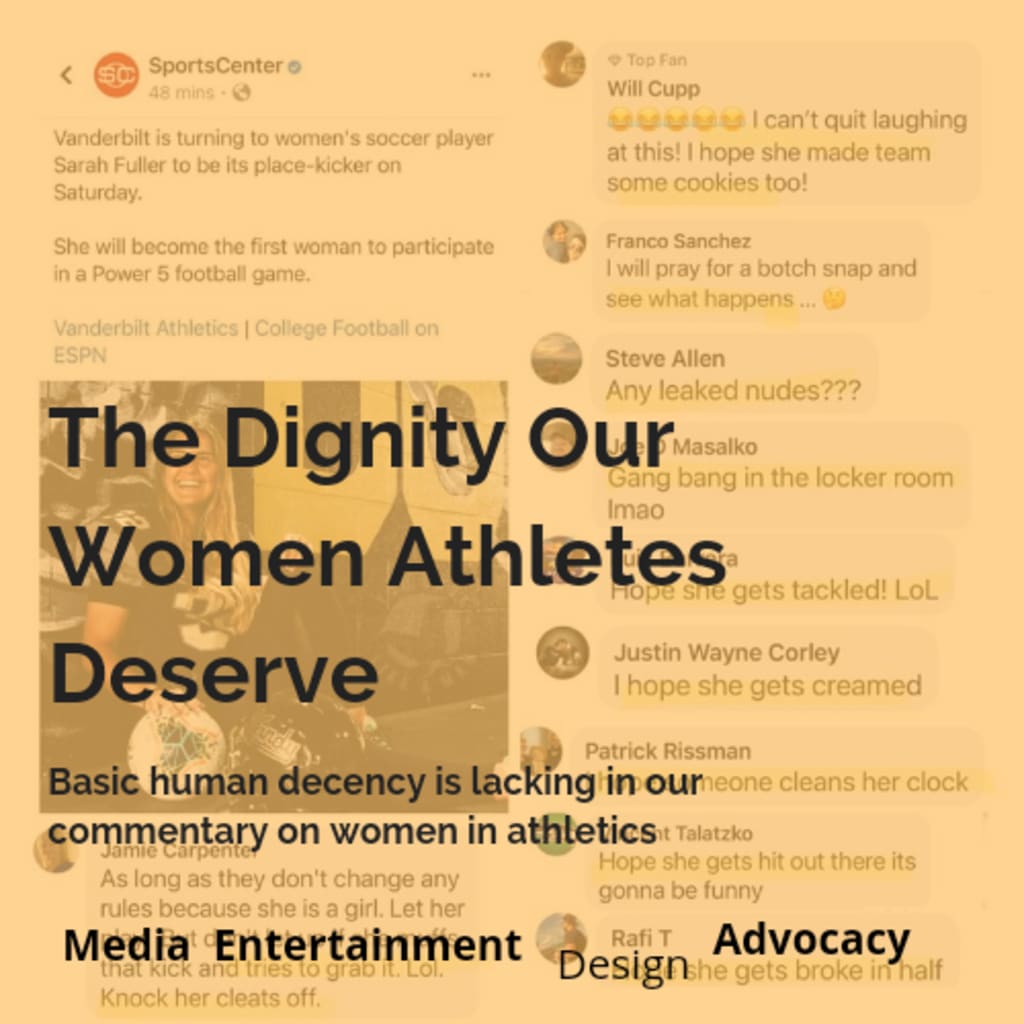The Dignity Our Female Athletes Deserve
Basic Human Decency is lacking in our commentary on Women in Athletics

We, as a society, have an issue with how we address women in athletics. In recent memory, there have been quite a few times when our female athletes have been commented on and criticized in ways that have very little to do with their actual athletic ability.
On Nov 28th, Sarah Fuller of Vanderbilt University became the first female athlete to appear in a Power Five Conference game; and the third to appear in the DI Football Bowl Subdivision (FBS). Standing at 6'2", she's the starting goalkeeper of her women's soccer team, helping the team turn a season around from a 0-2 start into a 7-2 finish.
She was recruited onto the football team after the team had a severe lack of kickers and was known amongst the coaches for having an amazing striking leg. In her tryouts, she recorded kicks within the 60-yard range, putting her within the range of most professional male kickers. By all standards, this woman is a dominant athlete, deserving of the praise she received for being one of the few women in athletics to play on a football field.
She wasn't deserving of the derogatory comments made against her just because of her being a woman on the field.
SportsCenter recorded multiple comments made against her that held a high bias against her being a woman playing a predominantly male sport. Some people asked for her to be targeted for tackles, others doubted her abilities, and some tweeted things that were straight-up sexual harassment.
Let's make a distinct clarification here, being an athlete naturally comes with critiques; this is not the issue, as long as those critiques stay within the realm of actual athletics. It's when those critiques come at the expense of someone's gender that they become an issue.
Asking for her exposed nudes and invading her personal life; stating she should be targeted to teach her a "lesson;" believing she's there for any other reason outside of her natural and hard-earned ability, shows that there is a severe lack of dignity given to female athletes, especially ones that break the mold. To make it worse, Sarah is far from the only women athlete to go through this.
Another example within the world of the Olympics is Caster Semenya. She's currently one of the fastest Women's 800m runners in the world, holding the spot at number 4 amongst the Top 25 All-Time Middle Distance runners. Not only is she a naturally gifted runner, but due to her genetics, she also has a higher testosterone level compared to most other women in athletics.
This has caused a bit of controversy around her, even though it's completely unnecessary. While she does have a genetic advantage, that advantage doesn't push her outside of the realms of what other female Olympians can and have done. She is widely critiqued for what can be summarized as a natural physical and genetic advantage. She's mislabeled, belittled, and attacked for not just being different, but for being different AND a woman.
In Olympic sports, it's almost a given that the more unique your body type is, the better you will do depending on your given specialty. Michael Phelps and Usain Bolt are both praised for the physical advantages they hold. Phelps' upper body, wingspan, and hand size allow him to move through the water easily, while his having shorter legs in comparison to his height helps eliminate the factor of resistance. Bolt is known for having incredibly long and powerful legs that give him a speed advantage. Though, to his credit, his height also gives him a disadvantage when coming out of the blocks.
Gymnasts are usually shorter, lighter in weight, and more flexible. Throwers are mountains in size, with larger muscles, and a great range of motion to better deal with heavy loads. Distance runners are slim built with long legs and have incredibly low muscle fatigue build-up. Sprinters are taller, evenly built, and have defined, yet explosive muscular builds. In any given realm of athletics, the person with the best physical advantages will most likely do the best in that area and is usually praised for this. Yet, for Caster and other women athletes such as Simone Biles and Serena Williams, this doesn't hold.
They each have been heavily critiqued for the physical advantages they hold, all having heard comments about being too masculine or physically fit, or being attacked for having more dominant personalities by showing confidence in their abilities, or even showcasing achievements that very few others could ever hope to pull off. They've also had to deal with straight-up sexually depraved comments and questions about their sexuality.
Their ethnicity is also a contributing factor in this as well, with all three being black women at the top of their respective fields, though there is a lot more to be said about this at a later day. This goes against what has become a standard in the world of athletics, causing a huge contradiction in how we praise and criticize female athletes in comparison to their opposing gender, and makes for a startling message that's being told to many of our younger women athletes.
That message? That being a male with advantages means you're born gifted and are meant to be great; being a female with advantages means you were born abnormal, and you're lucky to be great.
This isn't a message that we honestly believe, but it's the one that's quite apparent the more you look into women's athletics. It's one that we fundamentally need to change. But to do that first, we have to address the elephant in the room.
Men, we really must get over ourselves and get out of the mindset that women need to fit within our standards.
One of the biggest contributing factors to this is how men perceive sports, which is a masculine, tough, and ultra-competitive field that's beholden to working the hardest, having the most physical dominance, and being the most talented. None of these are bad; the issue is that we only attribute these factors to men.
It's a common trend (and almost a living trope) amongst men that women's athletics isn't to be taken as seriously as men's because they aren't as tough, competitive, or as good as men, which is just false. Women hold an incredible presence in the world of athletics. In NCAA, women athletes account for 44% of all athletes, with women's teams making up 56% of all NCAA teams. During the 2016 Olympics, women athletes made up 45% of all athletes attended. For the US team, the women's side brought home more medals than the men for the second time in a row, with them bringing in 61 medals compared to the men's 55. One of the world's best soccer teams (not just the best women's team, but one of the best teams in general) is the United States Women's Soccer Team, being one of the topped ranked teams in women's soccer for almost three decades.
It's also a common issue of men being more critical of women's physical presence for no reason other than they're women. If a guy is 6'5", 230lbs, and physically in shape, we praise them for their genetics or physique. Most of the time it is naturally assumed they play some sport at a professional or semi-professional level without question. But if a woman is even remotely over the height of 5'9" and/or holds similar characteristics, they're bashed for being too "manly." And if they do play a sport, it's assumed that it's not their life goal, passion, or profession. That, fundamentally, makes no damn sense. To be physically in shape isn't a masculine thing but just a thing that anyone can be.
Playing a sport at a competitive level isn't just something men do; everyone, regardless of gender, can play and compete at highly competitive levels. We, as men, must get out of the mindset that only men can be physically dominant or physically unique when it comes to athletics. We must also lose the narrative that only men are competitive or worth being seen in a competitive nature. Lastly, just stop being sexually debauchee children. If you wouldn't want it said to your mothers or sisters, don't let it escape your lips or come out of the keystrokes on your devices.
These women are more than deserving of dignity; the right of a person, independent of gender, to be treated ethically and equally. I use this term as oppose to respect because it often argued that respect must be earned. Dignity, on the other hand, is a natural given. To violate it is to violate the given rights and mortality of another person. So even if you believe that women athletes must earn your respect, that's fine. But, at the very least, give them the dignity as hard-working, competitive, dominant, and boundary-pushing athletes they deserve. Because if you can't even do that much, your respect isn't even worth their concern.
About the Creator
The MEDA Project
Hello, and welcome to The MEDA Project!
Media, Entertainment, Design, and Advocacy - describe the fields in which we will be engaged, educated, grown, studied, lived, and experience every day.






Comments
There are no comments for this story
Be the first to respond and start the conversation.